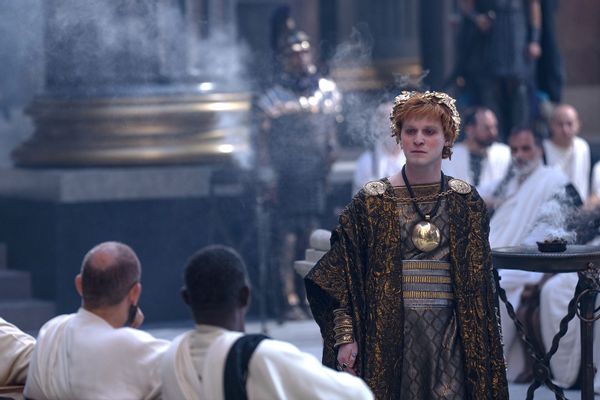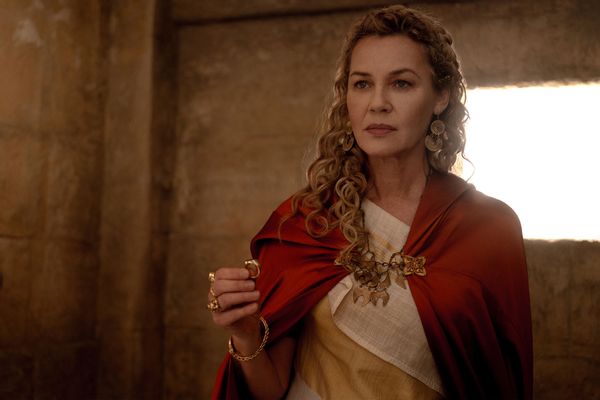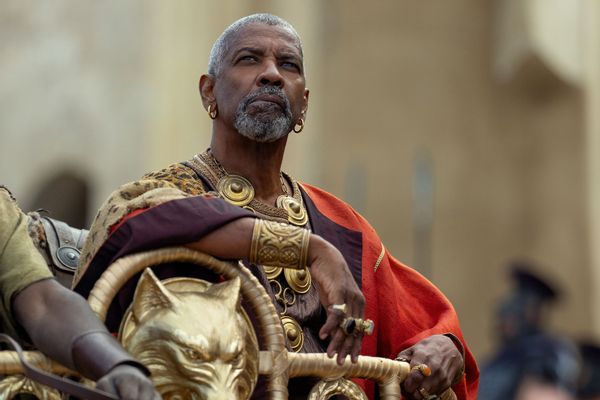
About two hours into "Gladiator II," Hanno (Paul Mescal) steps up to deliver a speech that might finally tell us why we should care about anyone or anything in Ridley Scott's newest sharks-and-sandals potboiler.
We've fought for nothing more than another day's survival, he tells the assembled NPCs/gladiators, but now you can join me and fight for a freedom far beyond these walls. The chosen one's voice ascends as he invokes the honor that once meant something in Rome. Now is the time to reclaim it, he declares, even though many of the people he's speaking to are probably foreigners who were captured by slave traders or as prisoners of war.
"Strength and honor," Hanno exhorts, and a hundred gladiators respond to the call, drowning out any pipsqueak who might venture to ask, "What does strength and honor actually mean?" or perhaps, "How did we even get here?"
We know nothing about the other gladiators, or how they got to the point where a boring speech was enough to suddenly awaken their class consciousness, but at least we know how Hanno got here. Exiled from Rome due to his political status, he was living happily in the "city" of Numidia before the Romans invaded, killed his wife and sold him into slavery. With a sword in his hand and vengeance in his heart, Hanno finds his way back to the imperial capital where he wins bloody renown in the Colosseum, reveals that he's actually named Lucius Verus and thus wades into the political intrigues at the apex of a corrupt and violent hierarchy.
It's an echo of Maximus' (Russell Crowe) journey in the first "Gladiator" movie, now with the technology to conjure sharks for a set-piece naval battle, rampaging rhinos and bloodthirsty baboons. The banal logic of repeating a successful narrative, except louder, is simple enough. Scott, as usual, also needs to shoehorn meaning that he doesn't know how to produce and erase history that he doesn't know how to replace.
Below, Salon digs into the missed opportunities that real history provided that could have made for far more intriguing action on our screen.
A military strongman in plain sight

In the year 2024, MMDCCLXXVII ab urbe condita, this is the message that Ridley Scott chose for his movie: Rome has been taken over by a foppish, effeminate class of men in perfumed silks. They direct wars of conquest from the comforts of Palatine Hill rather than lead the men themselves like in the good old days of Caesar massacring the Gauls. Power must be returned, by force, to a few rugged, brawny heroes in armor who know how to commit violence with their own hands, and only then can matters be set aright and the dream of Rome restored (whatever that means).
But even this rather authoritarian message is incoherent, because the film does occasionally pay lip service to the idea that war is bad, or at least should be kept to appropriate limits, such as when Acacius ponders the destruction he has wrought. As such, "Gladiator II" tries to separate virtuous general from venal politician, "just" violence from "unjust" violence, without recognizing that in a society that worships the sword, extols the soldier who wields it, and bays lustily at the poor man who is forced to reenact his deeds in the arena – all of those become largely one and the same.

Meanwhile, it's difficult to know what Geta looked like because Caracalla killed him and then embarked on some historical erasure of his own. During his six-year reign as sole emperor, Caracalla waged a pointless war against Parthia, viciously sacked a Roman city over an offensive play, largely ignored his administrative duties and aggravated an inflation crisis by paying the army with devalued coinage. (He also, for various debated motives, granted citizenship to all free men in the empire.) All that would have provided promising material for a "Gladiator II" villain representing a rot in the body politic, but Scott surprised no one by scorning history and instead pursuing easier targets that are more caricature (and act utterly insane) than human. Instead of "Gladiator II" deconstructing the mythos of Rome, it's the real Caracalla who acts as a warning for what Scott seems to think Rome — and any of its modern reflections — needs in a leader.
The missing history of women

The most famous during that era – Geta and Caracalla's mother Julia Domna, her sister Julia Maesa and Maesa's daughter Julia Mamaea – wielded political influence. Domna in particular was the key figure and stabilizing force behind the two co-emperors, protecting the interests of her family and administering the empire during Caracalla's long military adventures. Unfortunately, she failed in her attempts to mediate between the emperors before Geta's assassination – in a dramatic tableau that could have been lifted from the pages of history and placed on the screen.
It seems that Caracalla had agreed to a meeting with Geta at Domna's behest, but it was just a ruse to eliminate his rival. As Caracalla's centurions rushed forwards with steel drawn, Cassius Dio records that Domna held a terrified Geta in her arms, getting so thoroughly covered in her son's blood that she failed to notice the blow inflicted on her hand. The murder of Geta is Domna at her most traumatized and guilt-stricken, and even by itself is far more riveting than the story of "Gladiator II's" tepid Lucilla who – in rough sequential order – plots ineffectually, cries ineffectually, gets chained to a pillar and suffers from a bad case of arrow to chest.

For reasons unknown, that's one historical divergence that Scott chose not to take.
Revolution without meaning
While it's embarrassing that Scott not only takes pointless liberties but also insists that he's right and knows more than historians, the rejection of history is not a terrible flaw in and of itself. When the ultimate creation is less interesting than what people like Scott deride as boring textbook material, however, the failure lies with the creator. Even so, "Gladiator II" still had another chance to redeem itself through its namesake, in plural: the enslaved or condemned (and occasionally, free) fighters who must slaughter each other not only to entertain the people of Rome, but also to distract Rome's poor from their own exploitation by the ruling class and moneyed elites.
Alas, it turns out that the singular form of "Gladiator II" is key, because only one gladiator is named, and he's the main character. The rest of them in the film are ciphers whose motives, dreams, suffering and rage remain unknown to us. There is no emotional connection to them, and so there is no emotional resonance in their last-minute bid for freedom. Among them, only Lucius truly exists, and it is only through him that the other gladiators suddenly realize they can reclaim their agency and promptly entrust it to the man who would lead them.

But for the film's purposes, the challenge of igniting a rebellious spirit among a divided and deceived underclass falls on Lucius, and for the sake of the plot's momentum he must succeed, but only in a peculiar way that does not offer any tangible promise like civic rights or land redistribution. Even as the Roman people have taken over the streets, we hardly know their aims or what they want. Geta and Caracalla, we are told, rule tyrannically, and Lucius tells the people of the Colosseum that what happened to their political opponents can also happen to them. And so it is by the same means as the gladiators that the free men and women of Rome are incited, in the space of a few seconds by a vaguely obvious point and without any whiff of foreshadowing.
In Ridley Scott's theory of revolution, defiance is not born of gradual, conscious ferment among a collective people provoked by oppression, but bestowed to a formless mass by a single, heroic figure delivering a boring speech. By draining the people of agency, Scott may have joined forces with historical and modern precedent to unintentionally offer a most effective critique of his own theory: a meaningless impulse always leads to a meaningless revolution. In any case, it's neither convincing nor compelling as presented, and like Rome in its waning years, suffers more from aimless direction.
"Gladiator II" is currently in theaters nationwide.







